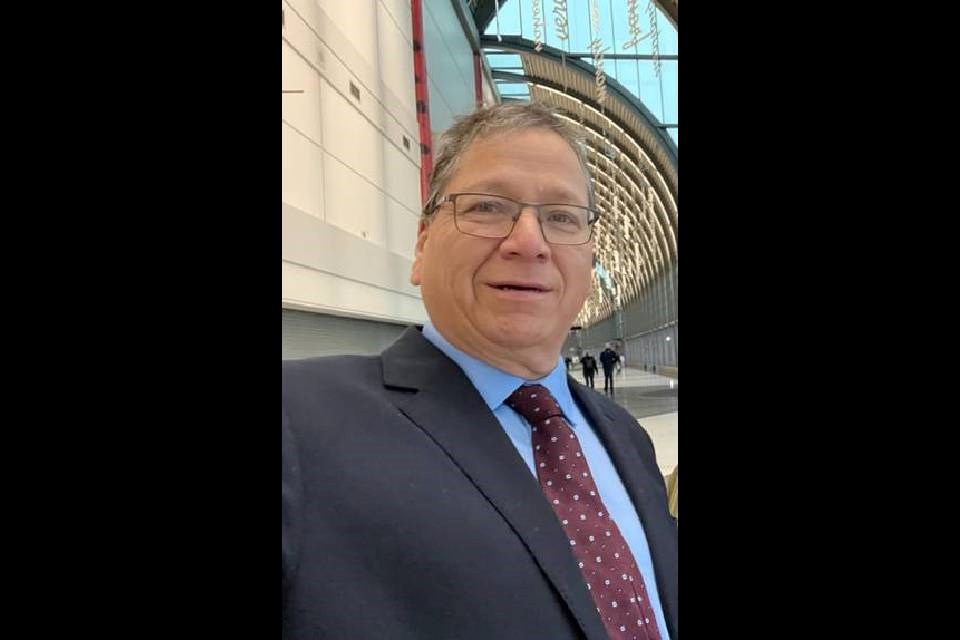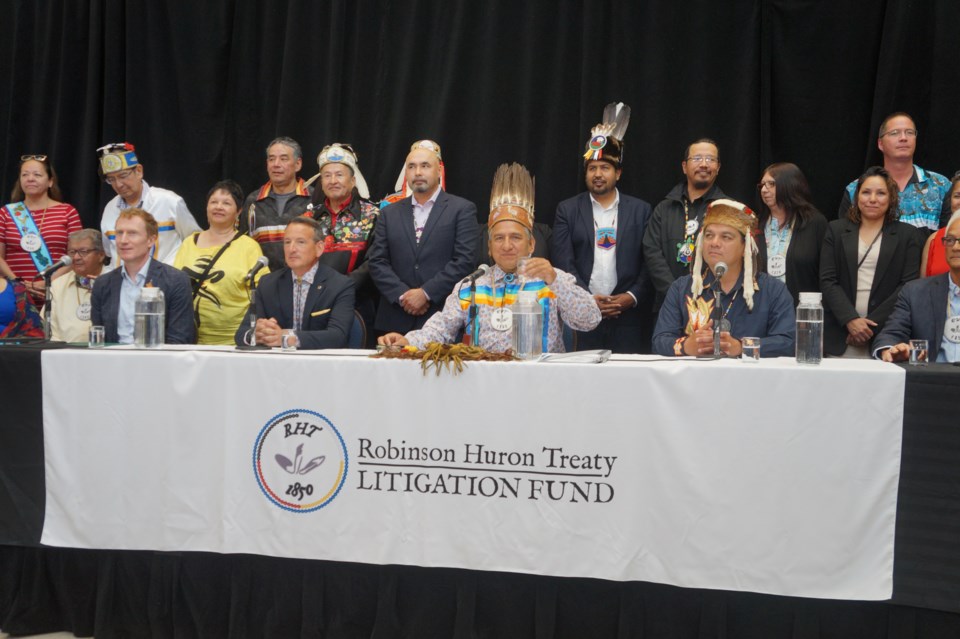From growing up “dirt poor” on Manitoulin Island in the 1970s to dispensing financial advice to some of Canada’s biggest national organizations in the 2020s.
That’s how Scott Flamand characterizes his life journey, so far.
Flamand spent more than a decade consulting the Canada Mortgage and Housing Corporation (CMHC) on Section 95 — the group’s On-Reserve Non-Profit Housing Program — in an effort to bring home ownership to Indigenous people.
He’s also sat across from some big players at the boardroom table — clients like the Business Development Bank of Canada (BDC) and the First Nations Market Housing Fund have called on Flamand — discussing housing programs for individual community members.
No matter who the client, the goal, Flamand said, is to make sure that people — mostly First Nation members — have a roof over their head and a little bit of money at the end of the day to draw upon.
“I try to help them come up with solutions on how people can become homeowners,” said Flamand, a member of Wiikwemkoong Unceded Territory. “Because there's a lot of people on reserve with good credit and good incomes that, if it wasn't for the Indian Act, they could probably afford a mortgage.”
Section 89(1) of the Indian Act protects property on reserves so it cannot be mortgaged and used as collateral by a non-First Nation person. It’s a hurdle, but Flamand works with people to secure mortgages, on- or off-reserve.
These days, Flamand is teaming up with Habitat for Humanity — at the time of this interview he was preparing a presentation for the organization's 45 CEOs — to help provide more of their work in Canada’s First Nations.
But despite the high-profile clients, Flamand — who describes himself as a “easygoing, and bit of a comedian” — is equally comfortable in one-on-one sessions. In addition to teaming with large corporations on housing, Flamand also provides financial advice to people looking to invest, or maybe have dug themselves into a bit of credit trouble they need to climb out of.
It all starts with the same idea: home ownership is wealth.
“I tell clients, you don't have to be rich to be a homeowner,” he said. “You just can't have too many of your toys — you know, your trucks, Ski-Doos and credit cards.
“Rein the spending in, I tell them. Live within your means.”
Flamand’s not-so-smooth history of personal wealth
Living within means is something that Flamand knows about.
Flamand said he remembers summers spent picking blueberries and cherries in Traverse City, Mich., with his family. Not as a hobby or a pleasant way to spend an afternoon, but working alongside Mexican migrants earning a living in the fields.
“At the time, I thought I was on vacation,” Flamand told Northern Ontario Business. “I remember going to Burger King in 1979 in Michigan, thinking we were rich. We were doing things people back home weren't doing — like getting to see The Empire Strikes Back.”
“But I didn’t think we were poor,” he said. “Even though our first stop in Michigan was to stop off for food stamps.”
The Island was a different place in the ’70s, Flamand said. Wild, open, friendly. If you were lucky enough, you may have had access to one TV set in the house. And the prospect of being less well-off than your neighbour didn’t weigh on anyone.
“We all worked back then; it’s just what we did. And we still lived on the land. We had huge gardens, and we raised livestock, too.”
His dad had several jobs — lumberjack, fisherman, berry-picker — but that didn’t seem so bad, because the house “was always crowded, we had these big potlucks … and we spent most summer days outside, running around, riding our bikes, getting chased by dogs.”
“I didn’t feel poor, and it didn’t seem like any of us were poor,” Flamand said, acknowledging that his parents probably felt a bit of stress feeding all the mouths around the table.
But if they did, they didn’t show it.

Years later, after realizing he had an aptitude for numbers and calculations, Flamand attained his commerce degree at Laurentian University. Soon after, he bought a house in Sudbury — renting part of the house to an Inco employee twice his age — then got married, and raised a family.
In between work and family life, Flamand hunkered down to earn his MBA, mostly through summer courses and night classes.
“I was a bit of a raccoon, doing all that work,” Flamand said.
Even with the degrees, becoming a homeowner provided the greatest lessons, Flamand said. It taught him the reality of responsibility, pride in ownership, and ways to make ends meet.
Which wasn’t always easy.
“I was buying these cheap cars for $2,000 in those days,” Flamand said. “Other guys were just champing at the bit to get their first truck.”
One of his purchases — an 85 Ford LTD — he picked up from an elderly man in Sudbury. He drove that car until it wouldn’t pass safety checks anymore.
“One time, I was at the bank, and the bank lady said, ‘Can you list your assets?’ So I said, ‘I have a 1984 Ford LTD.’”
The banker looked at him, incredulously.
“Mr. Flamand,” the banker said, “you clearly need a new car.”
“What are you talking about?” Flamand asked. “I just bought that three months ago.”
The banker’s face, Flamand said, turned beet red. But it’s lessons like that — he calls it resisting the urge to “keep up with the Joneses” that lets Flamand do his thing.
Now, part of his advice for individuals centres around educating people on limiting massive phone bills, which many might not realize can drastically impact their credit score.
It’s a surprisingly humdrum expense that can have a disastrous effect.
“I run into families with cell phone bills that are $700 a month,” he said. “And all these high school kids and young kids, they’ve all got big cell phone bills, and the phones themselves are what? $2,000 Apple phones in Grade 6 and 7? That's an expense I never had.
“Throw in inflation for food, and I don't know how families are doing it.”
Miss one of those massive payments, Flamand said, and you’ll end up with a flag on your credit score.
So far, Flamand said, he’s helped hundreds of people out of precarious financial situations — rebuilding bad credit ratings or paying off creditors.
It’s a serious job, and people aren’t often in a good situation when he meets with them. Stress and health problems often accompany financial straits. But Flamand’s lessons aren’t imparted without a bit of humour, he said.
“First thing they realize is that I’m just a regular guy. I tell them my own stories, and they realize I've made all these mistakes on my own,” he said.
And the first scrape he had with a collections agency?
“Blockbuster Video,” Flamand said of the former rental chain. “Fourteen dollars for a restocking fee.”
He also tells them of times he, too, could not resist an impulse purchase.
“One time I went in for an oil change for my minivan, and ended up buying a brand new minivan — it had a spoiler; it was a sport model.”
The monthly payments on that minivan, he said, were a bit of a struggle for the young family. But he vowed not to let his wants get ahead of his needs — house, food, education — again. It’s one of the key teachings he imparts to clients.
“I like working with people on their day-to-day struggles,” he said. “Just to show them that managing your activities has a long impact on what you're going to do in the future. And that’s really what I’m doing: teaching people about responsibility.”
Several communities have seen the value in having Flamand bring his stories — not to mention his expertise — to local youth.
Recently, Garden River First Nation asked Flamand to do a financial workshop with kids, in hopes they’d have some solid grounding to deal with any changes, or challenges, to their finances.
“I explain to young people that if you invest early — and you don't have to invest thousands of dollars — if you save about 30 bucks every two weeks and start investing, eventually it'll grow after 25, 30 years.”
“I also show them how to budget, to buy a used car, make sure they’re not getting negative equity on a car loan. It’s all about education, and about financial responsibility.”
Huron-Robinson Treaty settlements: ‘the massive reset’
It became a bit of concern for Flamand when the federal government began issuing its Robinson-Hury Treaty settlement payments, which was putting sizable cheques into the hands of people — especially young adults — who may not have a background in financial planning.
In 2018, the Superior Court of Justice ruled the Crown had an obligation under the 1850 Robinson-Huron Treaty to increase annuities as wealth generated from the land grew over time, so long as the Crown can do so without incurring a loss.
The annual treaty payments to Anishinaabe beneficiaries, also known as annuities, have remained at $4 per person since 1875. Prior to that, the annuities were equivalent to $1.60 per person.
Flamand said he feared that impulse buying would soon be out of control — new cars, sleds, and boats. But he also saw the immediate upside for a lot of band members with bad credit.
“It was a massive reset,” Flamand said.
“It usually takes me two to three years to restore a client’s credit, but with the Robinson-Huron, people can virtually pay off all their credit cards.”
Clients, he said, were posting thankful messages on their social media pages after seeing their credit scores dramatically improve in short periods of time — two months, in one case.
But the lessons weren’t done, Flamand said.
“It's great to see this,” he said. “But now you people know to live within your means. Don't go back that way, because there's not going to be a second Robinson-Huron.”




